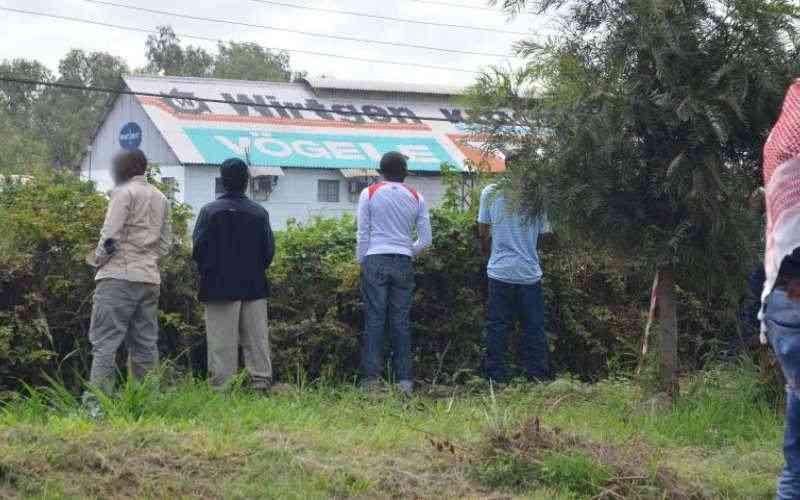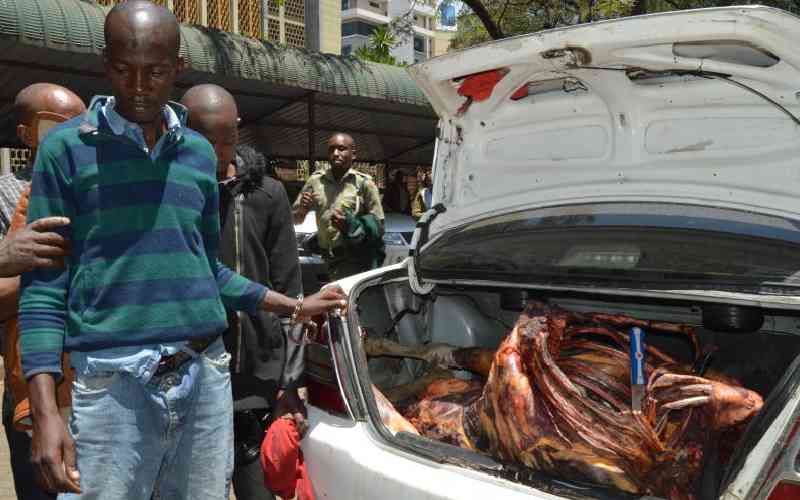The police department is mourning one of its sniffer dogs who died after chocking during practice in Lunga Lunga, Kwale County.
The dog named Rina and with tag number 1,395 died on Friday during a practice session with its handler.
Rina had been deployed to the Kenya Revenue Authority’s (KRA) Lunga Lunga border point, where he has been helpful in detecting contraband.
According to police, the dog, a Rottweiler, accidentally swallowed a tennis ball that the handler was using in practice.
“The animal was experienced and we see what happened as an accident. We don’t know how it swallowed it, but doctors will tell us,” said a senior officer, who added it will be accorded a respectful burial.
A postmortem examination on the carcass was planned yesterday to tell what caused the death, police said.
According to the handler, Rina accidentally swallowed the tennis ball and his efforts to save him were unsuccessful.
The officer said Rina bit one of his right-hand finger as he struggled to remove the ball from the dog’s throat in vain.
“It was accorded last respect ahead of the autopsy and burial,” said an officer aware of the plans.
Rina has been in service for four years during which it reportedly detected contraband at the various places, officials said.
Police dogs are usually handled with care as they are highly trained and their rearing takes a long time and is expensive.
The police department has a full-fledged dog unit based at Langata dubbed Langata K-9, which was established to support in care and maintenance of the dogs, procure and breed, train the animals and handlers and deploy them for crime detection and prevention.
The department usually sell the animals to prospective buyers. The animals include Rottweilers, English Spaniels, Boerboel, Labradors and German Shepherds.
Trusted partner
The Kenya Police Dog Unit, which opened its doors in 1948 in Nanyuki, uses different dogs for patrol, tracking firearms and drugs and explosives detection.
Stay informed. Subscribe to our newsletter
The German Shepherds were first introduced in Kenya in the 1950s and are mostly guard dogs used for crowd control, protection services as well as tracking. Rottweilers were introduced in Kenya in 2004.
The unit has about 5,000 dogs deployed in counties and at key institutions like airports, water reservoirs, Parliament and the Kenyatta International Convention Centre. Some are attached to VIPs, especially the president.
The canine law enforcers patrol streets, sniff out explosives and narcotics and chase or help arrest fleeing crime suspects.
The dogs are trained in patrol and tracking skills, narcotics and explosives detection. Training starts when the dogs are about five months old. They are then deployed after three months if they meet performance standards.
The unit has a training centre with three faculties, which include explosives, narcotics and protection.
At the unit, there are 500 dog handlers, who teach the animals to obey commands and perform specific tasks. These can range from simple obedience training to more advanced instructions and complex tactics.
The dogs are retired if they become injured to an extent where they will not recover completely or before they get to a state of being unable to perform.
The canines are also euthanised because the inactive ones can neither fit in the police unit or in society.
The dogs are normally put down by intravenous injection containing a high dose of pentobarbital or sodium thiopental. The few that escape death are either donated to the Kenya Society for the Protection and Care of Animals or the University of Nairobi’s College of Agriculture and Veterinary Sciences.
If these dogs are killed in the line of duty, they receive the same honours as their human partners.
 The Standard Group Plc is a
multi-media organization with investments in media platforms spanning newspaper
print operations, television, radio broadcasting, digital and online services. The
Standard Group is recognized as a leading multi-media house in Kenya with a key
influence in matters of national and international interest.
The Standard Group Plc is a
multi-media organization with investments in media platforms spanning newspaper
print operations, television, radio broadcasting, digital and online services. The
Standard Group is recognized as a leading multi-media house in Kenya with a key
influence in matters of national and international interest.
 The Standard Group Plc is a
multi-media organization with investments in media platforms spanning newspaper
print operations, television, radio broadcasting, digital and online services. The
Standard Group is recognized as a leading multi-media house in Kenya with a key
influence in matters of national and international interest.
The Standard Group Plc is a
multi-media organization with investments in media platforms spanning newspaper
print operations, television, radio broadcasting, digital and online services. The
Standard Group is recognized as a leading multi-media house in Kenya with a key
influence in matters of national and international interest.









